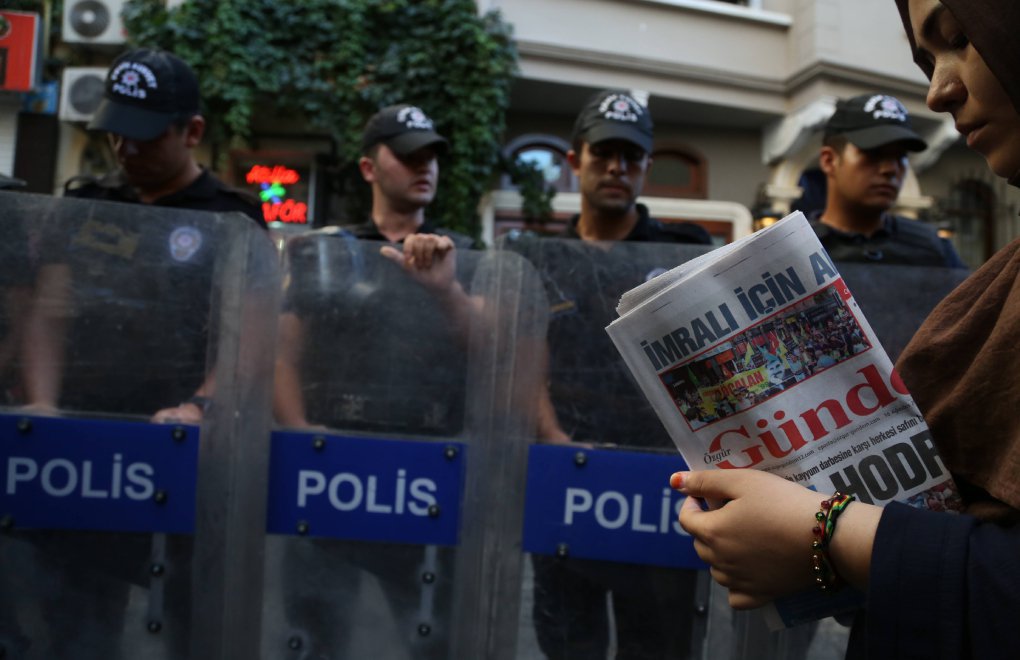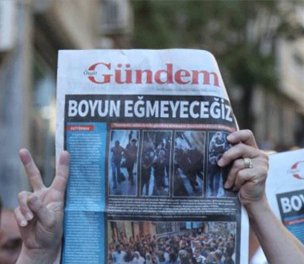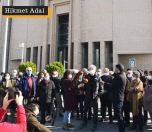Click to read the article in Turkish
As part of PEN Norway's Turkey Indictment Project, lawyers Hannah Beck and Clarissa Fondi have analyzed the indictment issued against journalists Reyhan Çapan and Hüseyin Aykol and Human Rights Association (İHD) Co-Chair lawyer Eren Keskin in Özgür Gündem newspaper case.
Standing trial at the İstanbul 13th Heavy Penal Court, Çapan, Aykol and Keskin are charged with "insulting the president" and "propagandizing for a terrorist organization" over the news reports published by the closed Özgür Gündem newspaper on September 8, 2015.
In their report published ahead of the 19th hearing on February 24, the lawyers have shared the following information about the daily:
"Özgür Gündem was a newspaper published between 1992 – 1994 and again between 2011 – 2016. Political difficulties increased and resulted in over 150 investigations against the newspaper under the Anti-Terror Law and Articles 301 and 299 of the Turkish Penal Code in 2016 alone.
"The majority of these investigations were followed by indictments accusing authors, editors and members of the consultant board of various offences."
Before elaborating further on the indictment filed against the three, Beck and Fondi have indicated that right after the general section, the prosecutor mixed up the names of two of the suspects:
"It seems to be a small, only formal mistake, nevertheless, it allows the reader to draw conclusions on the prosecutor's accuracy and diligence when drafting the indictment. This mistake is a result of carelessness within the drafting process and could easily be avoided."
'Incomplete presentation of evidence'
Reminding their audience about the charges brought against Çapan, Aykol and Keskin, the lawyers have said:
"This information is essential for the defendants as it helps them to understand the allegations and prepare a suitable defence. It therefore should be laid out in as much detail as possible. In regards to the place and date of the alleged crime, however, the prosecutor decided to keep it imprecise on page one by only mentioning '2015, İstanbul'."
The report has also found an incomplete presentation of evidence:
"On page two of the indictment as the last subcategory of the general section, evidence is listed as follows: 'Accusation, defence, and the scope of the whole investigation document'. This "list of evidence" does not give any specifics on the pieces of evidence the indictment is based on."
"The prosecutor should have further elaborated on the evidence list, instead he fell short of explaining his abstract references in violation of Turkish law," the lawyers have indicated further.
'Accusation of "insulting" baseless as well'
Moving on to the charge of "insulting the President" as per the Article 299 of the Turkish Penal Code (TCK), the lawyers have noted that in March 2016, the Venice Commission recommended the abolishment of this article by sharing the following commentary:
"The developments in Europe indicate that there is an emerging consensus that states should either decriminalise defamation of the Head of State, or limit this offence to the most serious forms of verbal attacks against heads of States while at the same time restricting the range of sanctions to those not involving imprisonment."
Accordingly, the lawyers have said:
"This 'European consensus' on limiting the offence to only the most serious forms of verbal attacks should have been taken into consideration by the prosecutor in the investigation phase.
"After a thorough (and correct) assessment of the freedom of press against the personal right of the president, the prosecutor should have come to the conclusion that the evidence is not sufficient to prepare an indictment in accordance with Article 170 (2) of the Criminal Procedure Code (CPC).
"In this respect, the second accusation of 'making propaganda for a terrorist organisation' proves to be baseless as well.
"In the light of the fatal absence of legal arguments, we could not observe the necessary compliance with the Turkish law.
Reference to the ECHR and ICCPR
"As the prosecutor of this indictment stated initially, Freedom of the Press is not limitless. This, in its core, is correct.
"But in order to restrict a media outlet's protection under Freedom of the Press, the reasons for these restrictions need to be legitimate according to Article 10 of the European Convention on Human Rights (ECHR) and Article 19 of the International Covenant on Civil and Political Rights (ICCPR)."
"It most certainly does not suffice for a newspaper article to not benefit a certain side. After all, it still benefits its purpose as a public watchdog and the prosecutor is therefore required, under international law, to acknowledge the journalist's rights protected by Art. 10 ECHR and Art. 19 ICCPR.
'Last word to the ECtHR'
The lawyers have reached the following conclusions about the indictment:
"In conclusion, the present indictment does not entirely meet international nor national standards. As has been elaborated in detail above a number of deficiencies could be detected.
"First of all, even though the indictment seems very well structured, the layout of the individual text bodies leads to difficulties in understanding the allegations. The prosecutor did not use a sufficient number of paragraphs and headlines, which made it harder to understand the allegations without misconceptions.
"Secondly, the prosecutor included a majority of the formal necessities in accordance to Turkish law, however, the absence of a comprehensive list of evidence constitutes an obvious and significant failure.
"Abstract references do not provide the necessary detail and are therefore inadequate to present the evidence. Furthermore, the accusations were not presented with the required detail and legal reasoning.
"Therefore, the indictment should have never been issued.
"Thirdly, the prosecutor's approach regarding Freedom of Expression and Freedom of the Press has strayed far from the international understanding of these rights, and their legitimate limitations.
"Any scope of possible interpretation regarding the margin of appreciation has been transgressed and the line of argumentation displayed in this indictment does not hold. In this context we would like to leave the last word to the ECtHR, who put it precisely to the point with the following statement:
"'The Court considers that it would be fatal for freedom of expression in the sphere of politics if public figures could censor the press and public debate in the name of their personality rights, alleging that their opinions on public matters are related to their person.'
Recommendations
"Therefore, we strongly urge the process of criminal prosecution in Turkey to be reviewed and improved. Following steps could be taken:
1. Drafting an indictment should always be in line with Art. 170 (3) CPC. We recommend that after finishing a first draft, the prosecutor should check if all the details prescribed by law were considered and can be found in the document. It might help to read the document from the point of view of the defendant to make sure that it is comprehensible and clear.
2. A clear format and headlines are absolutely essential and do not only help the defendants to understand the allegations, but could also be of importance to a prosecutor to develop a good and straightforward line of argumentation.
3. Regular awareness and legal training are of utmost importance. The prosecutors should always take into consideration the international standards and should be trained in applying the margin of appreciation doctrine when balancing individual rights with national interests.
4. Once again, we need to stress the importance of acknowledging the presumption of innocence as stipulated in Art. 6 ECHR. As an essential core function of a fair trial, it is also an irreplaceable element of any legitimate democracy. Unfortunately, this indictment has shown that the presentation of accusations based on correct legal arguments seems to pose the most difficulties when drafting the indictment.
5. Furthermore, we urge the authorities to reassess their understanding of"national interests, especially in the context of the true purpose of free press and media for a democratic society." (HA/SD)





-132.jpg)


